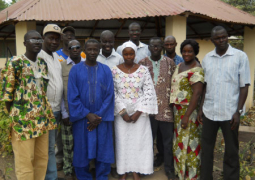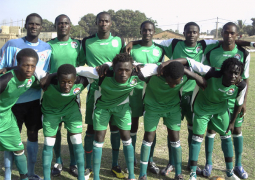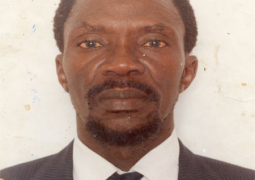
Halifa Sallah, spokesperson of the opposition Peoples Democratic Organisation for Independence and Socialism (PDOIS), has said that no political party has nominated him to be its presidential candidate ahead of the 24th November presidential polls.
Mr Sallah is stressing that what he has been advocating for is the selection of one candidate to stand for the opposition against the incumbent in order to increase chances of victory, and give The Gambia a new start.
Sallah was speaking in response to our last Friday story captioned “IEC Announces Nomination, Campaign Dates” in which we indicated, quoting political party sources, that he (Sallah) would be running for the presidency for a second time in a row.
In his response, which is carried below verbatim, Halifa Sallah stated that instead of making predictions of victory by the APRC, because of alleged opposition disunity, people should spend time enlightening the Gambian people about why no personality should be allowed to preside over the affairs of a country for two decades.
What follows is the full text of Halifa’s reaction:
You have conveyed to me that Henry Gomez has asked that Darboe, Hamat and my very self should give way for a new generation of presidential candidates to contest. I have told you that I argue with facts and figures, and not with opinions.
What compelled me to respond is the report in your paper last Friday referring to sources indicating that I will be a PDOIS Presidential candidate for the second time.
It is worth noting that no party has nominated me to be its presidential candidate. Needless to say, what I have been advocating for is the selection of one candidate to stand for the opposition against the incumbent in order to increase chances of victory, and give Gambia a new start by ensuring a democratic transition that would last only for one term.
It is proposed that the candidate be elected through a primary by all those who want democratic change.
I hope Mr Gomez who wants a fresh candidate would encourage a candidate who is better suited to win the support of the electorate to advocate for Agenda 2011, and start his or her campaign right away for the ticket of the opposition.
Finally, I wish to make it clear that no individual in PDOIS can unilaterally declare that he or she shall be a presidential candidate. The reason for this is simple.
Chapter 22 of the Constitution of PDOIS reads: Transitional Provisions
“The Committee established to ensure the registration of PDOIS shall constitute the Central Committee of the Party up to 11 December, 1997. A Congress shall be held on 11 December, 1997 to put the transition to an end and ensure the selection of officers according to the provisions of the Constitution. These transitional provisions shall cease to be in force upon the holding of the First Congress of the Party in 1997.
For the 1996 Presidential Election, the candidate for such election shall be the person proposed by the Central Committee and endorsed by 51% of the registered members as signified by being signatories to the nomination papers.
Subsequently, presidential candidates shall be chosen through primaries held in each administrative area. The person who receives the highest number of votes cast by the members in the various administrative areas shall be the Party’s presidential candidate.
The candidates for the 1996 National Assembly election shall be the persons proposed by the Central Committee after consultation with members of the Party, and endorsed by a majority of members in a given constituency.
Subsequently, candidates for National Assembly elections shall be determined by the members in each constituency in consultation with members of the Central Committee.
The Central Committee shall progressively work to sensitize capable women so as to facilitate gender, regional and ethnic balance in the Central Committee by 11th December, 1997 if it has not already been attained.”
PDOIS is a democratic party. It is not centralised under a party leader who could announce his or her candidature without the holding of primaries.
Hence before I could be a Presidential Candidate for PDOIS, I must win the votes of the members of PDOIS in each administrative area at a primary. Since such a primary has not taken place, no one could claim to be a PDOIS presidential candidate.
Finally, I would like people to know that I am not participating in elections because of any personal ambition to be an MP or President.
People would recall that even though I was the custodian of PDOIS during the final coup period, in defiance of the ban on political parties and political activities, and had earlier been offered a Ministerial post by the AFPRC government, which I declined, I did not become a Presidential candidate for PDOIS in the 1996 elections.
It goes without saying that even though I was offered a Ministerial post for the second time after 1997, I did not stand as presidential candidate in 2001.
It goes without saying that if I were to be a part of any alliance led by another person, that person would not be able to offer me any post I could not get under the Jammeh administration.
I am therefore only interested in witnessing the inauguration of that type of democratic government that will provide a five-year transition to assure the Gambian people greater liberty, and enlarged prosperity.
Instead of making predictions of victory by the APRC because of alleged opposition disunity, people should spend time enlightening the Gambian people about why no personality should be allowed to preside over the affairs of a country for two decades.
They should vote to promote their liberty and prosperity.
The advantage that Senegal has over The Gambia is that no one supports a political leader on the basis of tribe. Today the current President of Senegal cannot rely on tribe to stay in office, and no other opposition leader could rely on tribe to seek political office.
The Gambia should emulate this, and pursue leadership based on merit. This is the only way forward. Those who merit being selected should rise up, and be counted.




